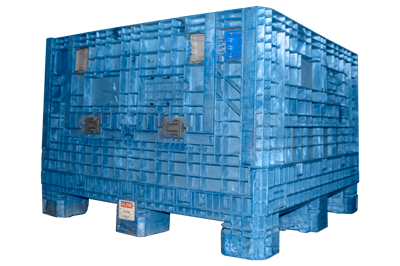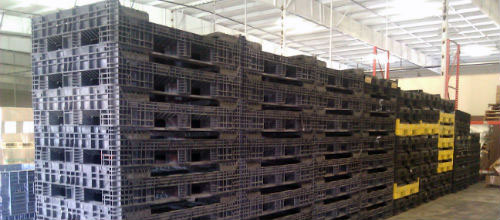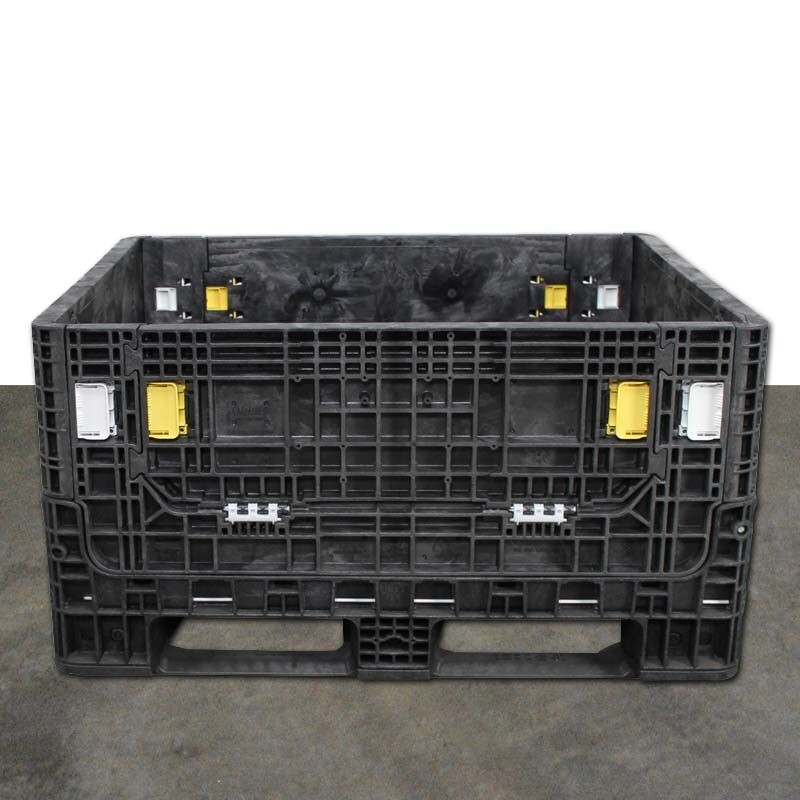Why Mass Containers Are Essential for Lasting and Economical Transport
Mass containers play a necessary role in contemporary logistics. They facilitate the reliable activity of large quantities of products, therefore enhancing transportation procedures. This method not only minimizes expenses yet also minimizes environmental effect through lower exhausts and waste generation. As markets seek more sustainable practices, the fostering of bulk containers is coming to be progressively significant. What ramifications does this change hold for future logistics and supply chain management?

The Advantages of Using Mass Containers in Logistics
Mass containers reinvent logistics by boosting efficiency and sustainability. These containers permit for the transport of big amounts of items in a solitary trip, substantially decreasing the number of journeys called for. This not just improves operations however also lessens labor costs related to handling, packing, and unloading. Additionally, mass containers are designed to enhance area utilization within transport vehicles, guaranteeing that more products can be delivered concurrently.
The standardization of bulk containers additionally simplifies the logistics procedure. With uniform measurements, they can be easily piled and stored, leading to boosted warehouse monitoring. Bulk containers usually feature resilient products that shield materials from damages during transit, therefore decreasing item loss and boosting overall integrity. Because of this, organizations can experience improved supply chain efficiency, inevitably bring about boosted productivity and consumer complete satisfaction. This combination of variables makes mass containers an essential possession in modern-day logistics.
Ecological Influence: Reducing Waste and Carbon Impact
As industries increasingly focus on sustainability, the fostering of mass containers has emerged as a key strategy for lowering waste and reducing carbon footprints. These containers reduce using product packaging materials, such as boxes and plastic, thus notably decreasing total waste generation. By settling deliveries, mass containers enhance transportation performance, enabling for more products to be delivered per trip. This reduction in journeys straight correlates with lower greenhouse gas discharges, adding to a smaller sized carbon footprint.
Bulk containers can commonly be reused or reused, further minimizing environmental effect. The resilience of these containers guarantees they can endure several transport cycles, minimizing the need for single-use options. used bulk containers. By simplifying logistics and promoting efficient source usage, mass containers not only support sustainable practices but additionally urge industries to line up with global environmental goals. Ultimately, their implementation reflects a commitment to ecological stewardship and accountable source administration
Expense Cost Savings: Exactly How Mass Containers Lower Transportation Expenditures
While many companies look for means to enhance their lower line, using bulk containers presents a significant chance for lowering transport expenses. Bulk containers make best use of the volume of items delivered, allowing services to ship bigger amounts simultaneously. This effectiveness lowers the variety of journeys called for, straight reducing gas costs and decreasing labor costs connected with loading and dumping.
In addition, mass containers often include streamlined designs that enhance space utilization within transport vehicles. This implies less empty rooms, leading to more reliable use readily available ability. The longevity of bulk containers can reduce the risk of product damages during transportation, ensuring and decreasing losses that even more items show up intact.
Enhancing Supply Chain Effectiveness With Bulk Storage Space Solutions
Mass storage space options play a crucial role in boosting supply chain efficiency by maximizing stock administration. By combining products right into less, bigger containers, companies can considerably decrease handling costs connected with regular transfers and processing. This structured technique enables much better tracking and monitoring of supply, eventually resulting in boosted functional performance.
Structured Stock Management
Reliable inventory management is essential for optimizing supply chain procedures, particularly when companies adopt bulk storage solutions. These solutions allow businesses to keep higher supply levels while lessening the regularity of replenishment. By combining materials into mass containers, business can improve their inventory processes, reducing the complexity connected with tracking multiple smaller bundles. This approach helps with precise inventory counts and improves forecasting precision, allowing for even more educated decision-making. Additionally, bulk storage space solutions simplify storehouse organization, making it easier to situate and gain access to items when needed. Because of this, companies can attain an extra reliable supply turn over rate, inevitably boosting total supply chain performance and lowering the probability of stockouts or overstock scenarios.

Minimized Handling Expenses
The execution of bulk storage options not just improves inventory administration yet also substantially minimizes managing prices across the supply chain. By settling products into mass containers, firms reduce the requirement for frequent handling and transfer between various storage space and transportation units. This method reduces labor expenses connected with loading, discharging, and relocating smaller plans. Furthermore, bulk storage minimizes the regularity of deliveries, leading to lower transportation costs and lowered gas consumption. As a result, organizations can enhance their logistics procedures, permitting an extra effective allotment of resources. Eventually, minimized taking care of prices add to improved overall supply chain effectiveness, fostering an atmosphere that sustains both sustainability and financial viability.

Versatility of Mass Containers Across Numerous Industries
Lots of industries have distinctive requirements for transportation and storage space, mass containers have emerged as a versatile remedy that meets a wide variety of needs. These containers, ranging from big bins to specialized storage tanks, can accommodate diverse products, including granules, liquids, and powders. In the agricultural sector, bulk containers assist in the transportation of grains and fertilizers, while the food and drink market uses them for components and finished items. The chemical market depends on mass containers for securely delivering hazardous materials, guaranteeing compliance with safety and security guidelines. Additionally, building and construction firms benefit from mass containers for transporting accumulations and other materials. Their adaptability includes various modes of transport, including trains, ships, and vehicles, enhancing logistical performance. This versatility not only improves procedures throughout different industries however additionally advertises sustainability by reducing product packaging waste and maximizing space in transit. Mass containers play a vital function in contemporary supply chain administration.
Future Patterns in Bulk Container Usage and Sustainability
The future of bulk container usage is progressively shaped by cutting-edge materials advancement that boosts sustainability. Additionally, automation in logistics guarantees to improve operations, lowering waste and improving performance. Accepting circular economic climate techniques will additionally revolutionize just how bulk containers are created, used, and reused, promoting an extra lasting transportation landscape.
Cutting-edge Products Advancement
As markets increasingly prioritize sustainability, innovative products development wholesale containers becomes a considerable consider boosting environment-friendly transportation services. Producers and scientists are checking out biodegradable plastics, recycled composites, and light-weight metals to lower ecological influence. These products not only reduce waste but also improve fuel performance by decreasing the overall weight of containers. Additionally, advancements in smart products, which can adapt to differing conditions, enhance the durability and capability of mass containers. The assimilation of these ingenious products straightens with circular economic climate concepts, promoting reuse and recycling. As the demand for sustainable practices grows, the growth of such materials will certainly play an important role in forming the future of mass container usage in logistics and transportation.
Automation in Logistics
Substantial developments in automation are poised to transform logistics and the utilization of mass containers, enhancing sustainability in transportation. Automated systems, consisting of drones and autonomous automobiles, are improving the motion of mass containers, lowering the reliance on traditional fuel-powered transportation. These innovations enhance directing and filling procedures, boosting and lessening empty miles fuel effectiveness. Additionally, automated stock administration systems enhance monitoring and tracking of bulk containers, ensuring far better source allotment and minimized waste. The assimilation of the Internet of Points (IoT) permits real-time data evaluation, allowing proactive decision-making that lines up with sustainability objectives. As automation proceeds to progress, it is expected to drive even more innovations in bulk container use, inevitably supporting more sustainable logistics techniques and reducing the ecological effect of transport.
Circular Economic Situation Practices
Innovations in automation are establishing the stage for a more integrated technique to circular economic climate practices in the domain name of bulk container usage. As markets increasingly embrace sustainability, mass containers are being made for durability and reusability. This change not just minimizes waste but likewise improves resource effectiveness. Companies are adopting methods such as closed-loop systems, where used containers are collected, reconditioned, and reestablished into the supply chain. Furthermore, smart modern technologies track container life cycles, promoting better administration and reducing ecological impact. The cooperation in between producers, logistics service providers, and end-users is vital in establishing criteria for sustainable container use. used collapsible containers. Future trends suggest a growing focus on materials that are recyclable and eco-friendly, further reinforcing the circular economic climate's principles in mass transport

Regularly Asked Concerns
What Materials Are Mass Containers Generally Made From?
Mass containers are normally built from sturdy materials such as high-density polyethylene, steel, aluminum, and cardboard. These products give defense, strength, and convenience, making them appropriate for transferring different goods in different sectors efficiently.
Exactly how Do I Pick the Right Dimension Bulk Container?
Selecting the ideal dimension bulk container entails assessing the quantity of products to be moved, taking into consideration dealing with devices compatibility, and appraising storage area needs. Appropriate size assurances efficiency in transport and minimizes waste throughout shipment.
Are Mass Containers Reusable or Recyclable?
Bulk containers are typically recyclable, developed for numerous trips, boosting sustainability. Lots of can likewise be reused, depending upon the products used. Picking recyclable choices further minimizes and supports environmental objectives waste in transport techniques.
What Security Laws Put On Mass Container Transport?
Security guidelines for bulk container transport include compliance with the Division of Transport guidelines, proper labeling of unsafe materials, architectural stability analyses, and adherence to weight limitations to assure risk-free handling and stop mishaps during transportation.
Just How Can Organizations Shift to Using Bulk Containers Successfully?
Companies can alter to bulk containers by assessing current logistics, training team on handling, buying appropriate tools, maximizing inventory management, and working together with suppliers to assure compatibility and performance throughout the supply chain.
As sectors significantly prioritize sustainability, the fostering of mass containers has emerged as a key technique for minimizing waste and decreasing carbon impacts. By settling materials into mass containers, firms can streamline their supply processes, decreasing the complexity connected with tracking several smaller bundles. As sectors progressively prioritize sustainability, cutting-edge products advancement in mass containers arises as a considerable aspect in improving environmentally friendly transport remedies. Automated systems, consisting of drones and independent vehicles, are streamlining the activity of mass containers, lowering the reliance on conventional click here fuel-powered transportation. In addition, automated inventory management systems improve monitoring and surveillance of bulk containers, ensuring better source allowance and decreased waste.